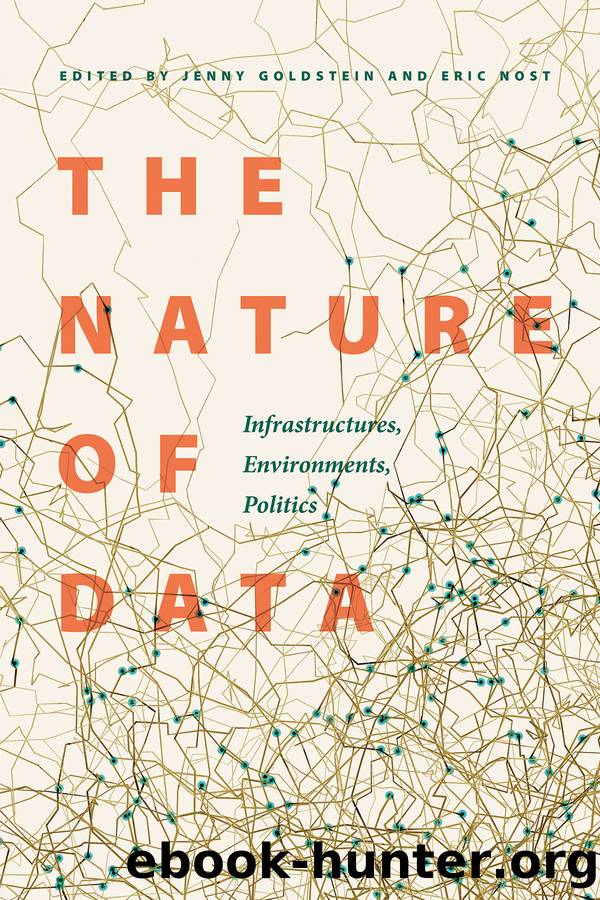The Nature of Data: Infrastructures, Environments, Politics by Unknown

Author:Unknown
Language: eng
Format: epub
Tags: COM062000 COMPUTERS / Data Science / Data Modeling & Design, NAT011000 NATURE / Environmental Conservation & Protection, TEC036000 TECHNOLOGY & ENGINEERING / Remote Sensing & Geographic Information Systems
Publisher: Nebraska
Reconfiguring Expertise through Data Infrastructure
Each of these three projects contributes in different ways to a broader movement toward knowledge and information sovereignty for Arctic Indigenous communities. Arctic residents express growing impatience with research practices that are disconnected from local goals and priorities. Many have strong concerns about researchers who have come, conducted interviews, and failed to inform them of the results of the research.28 From their perspective, climate change has brought not only changes in the marine and terrestrial environment that have affected subsistence practices but also a growing interest on the part of researchers, who also affect the fragile ecosystem of Arctic communities in significant ways.29
These politics are mediated by formal institutions that have been developed at different scales of governance in the region. Calista Education and Culture Inc. is an example of such an institution operating at the community scale. Calista facilitates community-driven research projects and helps connect community interests in knowledge preservation with outside resources such as project funding and assistance with development of relevant data infrastructure. Projects like those of CECI are the easiest to evaluate as contributing to knowledge sovereignty, since they are defined and controlled at the local level, and community members have authority to determine how data is shared and who it is shared with. The data infrastructures developed at this level may be less likely to be compatible with larger ones; questions of interoperability are less prominent, since data is not intended to be used within broader analyses where other forms of data are also present.
Although implemented in Alaska, SIZONet and AAOKH are a good example of a regionally focused initiative that engages different kinds of knowledge, recognizing that community members and academic researchers have different perspectives on and bring different kinds of expertise to understanding the sea ice environment. In this case the data infrastructure that ELOKA assisted in developing was designed to facilitate analysis of local observations across a number of different locations and over time. This kind of comparison is much more difficult using traditional oral knowledge transmission methods. The online infrastructure is democratizing in that it facilitates access to and analysis of observations by everyone involved with the project, from community observers to academics, as well as opening up these resources to the public.
The infrastructure was designed around the specific needs of the project, including the need to recognize and maintain contextual elements of recorded observations, but it also has the potential for connection with similar efforts in other parts of the Arctic. ELOKA has worked to adapt the SIZONet and AAOKH interface for a community-based monitoring project in Greenland focused on natural resource use within the marine environment.30 The political goal to which the project contributes could be described as one of local control over knowledge and data, but within a context of collaboration and coproduction of knowledge. The data infrastructure requirements for this include the ability to build links between projects and to facilitate use of observations contributed by local observers within larger or broader scientific and decision-making processes.
Download
This site does not store any files on its server. We only index and link to content provided by other sites. Please contact the content providers to delete copyright contents if any and email us, we'll remove relevant links or contents immediately.
Chaco's Northern Prodigies : Salmon, Aztec, and the Ascendancy of the Middle San Juan Region after AD 1100 by Paul F. Reed(368)
Digital International Relations by Unknown(366)
Law Enforcement Interpersonal Communication and Conflict Management by Brian Douglas Fitch(359)
Skilled interpersonal communication: Research, theory and practice, Fifth edition by Owen Hargie(341)
The Enduring Color Line in U.S. Athletics by Krystal Beamon Chris M. Messer(340)
Critical Perspectives on Human Security : Rethinking Emancipation and Power in International Relations by David Chandler; Nik Hynek(336)
EPSO CAST Political affairs EU policies: How to succeed in the selection procedure by Franco Reverte José María(313)
Evidence-Based Policy Making in Labor Economics by Hamermesh Daniel S.;Nottmeyer Olga K.;Nottmeyer Olga;King Sarah;King Sarah;King Sarah;(309)
Writing Public Policy - A Practical Guide to Communicating in the Policy Making Process by Catherine F. Smith(292)
Criminological Theory in Context by John Martyn Chamberlain(286)
Tibeton Yoga Its Secret Doc by Evans-Wentz(280)
Rothschild and Early Jewish Colonization in Palestine (Geographical Perspectives on the Human Past) by Ran Aaronsohn(280)
Threshold Concepts in Women's and Gender Studies by Christie Launius Holly Hassel(273)
Social Problems, Social Issues, Social Science by James Wright(272)
Positive Psychology and Spirituality in Counselling and Psychotherapy (Conflict, Ethics, and Spirituality, 12) by unknow(271)
Play in child development and psychotherapy: toward empirically supported practice by Sandra W. Russ(269)
Cognitive Development in Infancy and Childhood (Elements in Child Development) by Mary Gauvain(269)
Latin American Politics and Society by Gerardo L. Munck & Juan Pablo Luna(238)
What Makes a Social Crisis?: The Societalization of Social Problems by Jeffrey C. Alexander(227)
